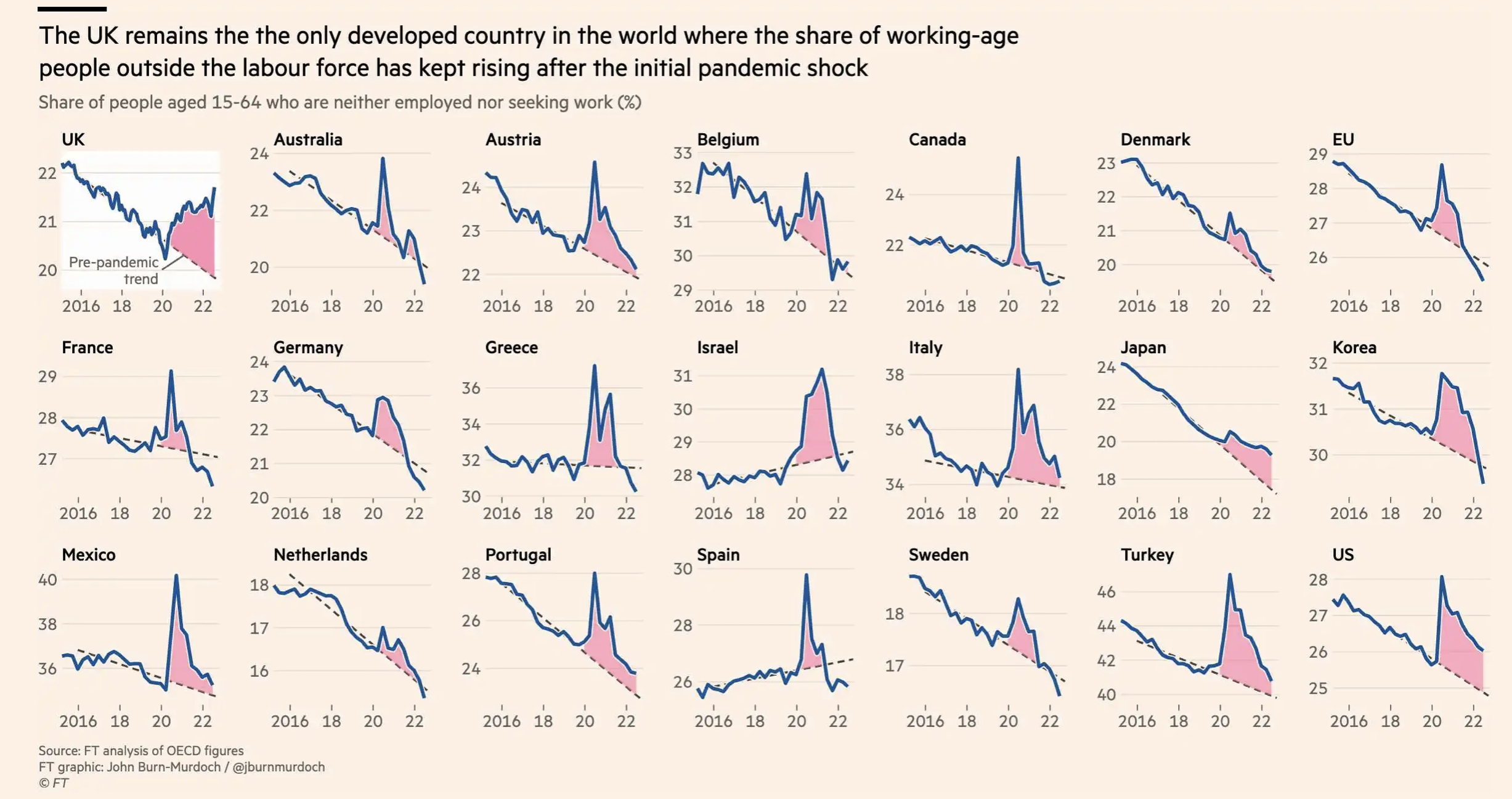monkfish
pfm Member
Is this irony?
WYSIWYG.
Is this irony?
No. In what way would it be?Is this irony?
Thanks. Glad I don't read it, the man is writing nonsense. Why would anyone take as gospel the word of a political editor when it comes to saving energy? The 'campaign' was poorly thought through and would have been a waste of money. Good decision to bin it.Political Editor, The Times.

Half a million missing (ex-)workers post Covid might go some way to explaining the UK's "growth problem", or at least the part of it over-and-above the general global growth problem.
Wonder why*, and what the government's plan to address this is?

* - The FT article "Half a million missing workers show modern Britain’s failings" goes on to show the post Covid increases in people unable to work due to chronic pain and mental health issues. What it doesn't explain is why the UK is worse in this regard than other countries.
So, at a time of high inflation, the BoE acted to try to bring down inflation, which sounds benign. But higher interest rates and mortgage rates hurt the indebted, and help lenders. And that's the accusation, I think. The BoE is making ordinary people pay as it strives towards structural goals that support financial services firms/rentiers. It is not clear that the BoE is hammering the ordinary people on purpose; maybe it just wants its tools back: a reasonable rate of inflation and interest rates well above zero. But it doesn't seem to care who pays.
You are René Artois AICMFP.
"Listen very carefully, I will say thees only wance..."And the Chancellor? "I spook with the Bonk of England and they pissed my plan for the economy..."
Could be but ill health seems to be a significant factor.Is it an anomaly where Covid chased off the remaining immigrants from the EU or do we know for a fact this 500k are indigenous, still in the population and not working?
Might Boris be the Fallen Madonna with the big boobies?You are René Artois AICMFP.
Is it an anomaly where Covid chased off the remaining immigrants from the EU or do we know for a fact this 500k are indigenous, still in the population and not working?
And the Chancellor? "I spook with the Bonk of England and they pissed my plan for the economy..."
Might Boris be the Fallen Madonna with the big boobies?
Might Boris be the Fallen Madonna with the big boobies?
Bloody hell. What a country. And before I get the usual Why don't you leave then, the thought has occurred. I'm less and less confident it's a safe place to raise my children.The FT article the diagram is taken from is titled "Chronic illness makes UK workforce the sickest in developed world"
Chronic illness is the main driver of this stalled labour recovery. Of the roughly half a million Britons aged 15-64 missing from the workforce, two in three cite long-term illness as their reason for not holding or seeking a job. It would be easy to point the finger of blame at Britain’s handling of the virus, but the data suggest otherwise.
...
With direct impacts of Covid ruled out, the most plausible remaining explanation is grim: we may be witnessing the collapse of the NHS, as hundreds of thousands of patients, unable to access timely care, see their condition worsen to the point of being unable to work. The 332,000 people who have been waiting more than a year for hospital treatment in Britain is a close numerical match for the 309,000 now missing from the labour force due to long-term sickness.
https://www.ft.com/content/c333a6d8-0a56-488c-aeb8-eeb1c05a34d2
That’s grim. It would be interesting to see the data broken down by age group and more specifics from the ‘waiting for hospital treatment’ headline- ie does that include waiting to be seen from first referral or already seen but further tests/ surgery not completed? Government was aware Covid would create longer term problems in society and budget ( at least where I am) was allocated to define the problem of ‘long covid’.The FT article the diagram is taken from is titled "Chronic illness makes UK workforce the sickest in developed world"
Chronic illness is the main driver of this stalled labour recovery. Of the roughly half a million Britons aged 15-64 missing from the workforce, two in three cite long-term illness as their reason for not holding or seeking a job. It would be easy to point the finger of blame at Britain’s handling of the virus, but the data suggest otherwise.
...
With direct impacts of Covid ruled out, the most plausible remaining explanation is grim: we may be witnessing the collapse of the NHS, as hundreds of thousands of patients, unable to access timely care, see their condition worsen to the point of being unable to work. The 332,000 people who have been waiting more than a year for hospital treatment in Britain is a close numerical match for the 309,000 now missing from the labour force due to long-term sickness.
https://www.ft.com/content/c333a6d8-0a56-488c-aeb8-eeb1c05a34d2
Bloody hell. What a country. And before I get the usual Why don't you leave then, the thought has occurred. I'm less and less confident it's a safe place to raise my children.
So, at a time of high inflation, the BoE acted to try to bring down inflation, which sounds benign. But higher interest rates and mortgage rates hurt the indebted, and help lenders. And that's the accusation, I think. The BoE is making ordinary people pay as it strives towards structural goals that support financial services firms/rentiers.
